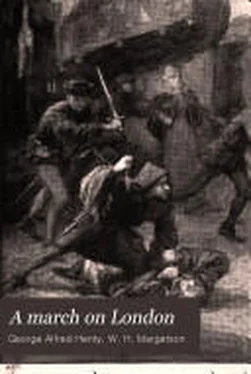“Do you think of undertaking his education yourself?”
“By no means,” Mr. Ormskirk said, hastily. “It would be impossible for me to find time at present, but when he has completed his studies I should then take him in hand myself, make him my companion and assistant, and teach him all that is known of science.”
“But in the meantime?”
“In the meantime? Yes, I suppose something must be done. I might get him a tutor, but that would be a great disturbance to me. I might send him up to the monastery at Westminster, where the sons of many gentlemen are taught.”
“I doubt whether the training, or rather want of training, that he has had would fit him for Westminster,” the Prior said, quietly. “There is another plan that perhaps might be more suitable for him. One of our brethren is a scholar, and already three or four of the sons of the gentry in the neighbourhood come to him for three hours or so a day. Our convent is a poor one, and the fees he receives are a welcome addition to our means.”
“Excellent!” Mr. Ormskirk said, delighted at the difficulty being taken off his shoulders, “It would be the very thing.”
“Then perhaps you will speak to the boy, and lay your orders upon him,” the Prior said. “He was in the village as I passed by, and I brought him up here, very much against his will I admit. Then I gave him in charge on arrival to your servitor, knowing that otherwise the young varlet would slip off again as soon as my back was turned. Perhaps you will send for him.”
Mr. Ormskirk rang a bell. The housekeeper entered.
“Where is Andrew?” he asked.
“He is looking after Master Edgar, sir. His reverence told him to do so, and he dare not leave him for a moment or he would be off again.”
“Tell Andrew to bring him in here.”
A minute later the old servant entered with the boy. Edgar was in a dishevelled condition, the result of several struggles with Andrew. His face was begrimed with dirt, his clothes were torn and untidy. His father looked at him in grave surprise. It was not that he had not seen him before, for occasionally he had noticed him going across the garden, but though his eyes had observed him, his mental vision had not in any way taken him in, his thoughts being intent upon the work that he had reluctantly left to take a hurried meal.
“Tut, tut, tut!” he murmured to himself, “and this is my son. Well, well, I suppose he is not to be blamed; it is my own fault for being so heedless of him. This is bad, Edgar,” he said, “and yet it is my own fault rather than thine, and I am thankful that the good prior has brought your condition before me before it is too late. There must be no more of this. Your appearance is disgraceful both to yourself and me—to me because you are in rags, to yourself because you are dirty. I had never dreamt of this. Henceforth all must be changed. You must be clothed as befits the son of a gentleman, you must be taught as it is right for the son of a scholar to be, and you must bear in mind that some day you will become a gentleman yourself, and I trust a learned one. I have arranged with the good prior here that you shall go every day to the monastery to be instructed for three hours by one of his monks. In future you will take your meals with me, and I will see that your attire is in order, and that you go decent as befits your station. What hours is he to attend, Prior?”
“From nine till twelve.”
“You hear—from nine to twelve. In the afternoon I will procure a teacher for you in arms. In these days every gentleman must learn the use of his weapons. I, myself, although most peacefully inclined, have more than once been forced, when abroad, to use them. A man who cannot do so becomes the butt of fools, and loses his self-respect.”
“I shall like that, sir,” Edgar said, eagerly. “I can play at quarter- staff now with any boy of my size in the village.”
“Well, there must be no more of that,” his father said. “Up to the present you have been but a child, but it is time now that you should cease to consort with village boys and prepare for another station in life. They may be good boys—I know naught about them—but they are not fit associates for you. I am not blaming you,” he said more kindly as he saw the boy's face fall. “It was natural that you, having no associates of your own rank, should make friends where you could find them. I trust that it has done you no harm. Well, Prior, this day week the boy shall come to you. I must get befitting clothes for him, or the other pupils will think that he is the son of a hedge tinker.”
An hour later Andrew was despatched to Dartford in a cart hired in the village, with orders to bring back with him a tailor, also to inquire as to who was considered the best teacher of arms in the town, and to engage him to come up for an hour every afternoon to instruct Edgar.
Seven years had passed since that time, and the rough and unkempt boy had grown into a tall young fellow, who had done fair credit to his teacher at the convent, and had profited to the full by the teaching of the old soldier who had been his instructor in arms. His father had, unconsciously, been also a good teacher to him. He had, with a great effort, broken through the habits to which he had been so long wedded. A young waiting-maid now assisted the housekeeper. The meals were no longer hastily snatched and often eaten standing, but were decently served in order, and occupied a considerable time, the greater portion of which was spent in pleasant chat either upon the scenes which Mr. Ormskirk had witnessed abroad, or in talk on the subjects the boy was studying; sometimes also upon Mr. Ormskirk's researches and the hopes he entertained from them; and as Edgar grew older, upon the ordinary topics of the day, the grievances caused by the heavy taxation, the troubles of the time and the course of events that had led to them; for, although very ignorant of contemporary matters, Mr. Ormskirk was well acquainted with the history of the country up to the time when he had first gone abroad.
The recluse was surprised at the interest he himself came to feel in these conversations. While endeavouring to open his son's mind he opened his own, and although when Edgar was not present he pursued his researches as assiduously as before, he was no longer lost in fits of abstraction, and would even occasionally walk down to the village when Edgar went to school in order to continue the conversation upon which they were engaged. Edgar on his part soon ceased to regard his father as a stranger, and his admiration for his store of information and learning served as a stimulant to his studies, for which his previous life had given him but little liking.
For the last two years, however, his father had seen with regret that there was but little hope of making a profound scholar of him, and that unless he himself could discover the solution of the problems that still eluded him, there was little chance of it being found by his successor.
Once roused, he had the good sense to see that it was not in such a life that Edgar was likely to find success, and he wisely abandoned the idea of pressing a task upon him that he saw was unfitted to the boy's nature. The energy with which Edgar worked with his instructors in arms—who had been already twice changed, so as to give him a greater opportunity of attaining skill with his weapons—and the interest with which the lad listened to tales of adventure, showed the direction in which his bent lay. For the last two years his father had frequently read to him the records of Sir Walter Manny and other chroniclers of war and warlike adventure, and impressed upon him the virtues necessary to render a man at once a great soldier and a great man.
“If, my boy,” he said, “you should some day go to Court and mingle in public affairs, above all things keep yourself clear of any party. Those who cling to a party may rise with its success, but such rises are ever followed by reverses; then comes great suffering to those upon the fallen side. The duty of an English gentleman is simple: he must work for his country, regardless altogether of personal interest. Such a man may never rise to high rank, but he will be respected. Personal honours are little to be desired; it is upon those who stand higher than their neighbours that the blow falls the heaviest; while the rank and file may escape unscathed, it is the nobles and the leaders whose heads fall upon the block. I think that there are troubles in store for England. The Duke of Gloucester overshadows the boy king, but as the latter grows older he will probably shake off his tutelage, though it may be at the cost of a civil war.
Читать дальше












